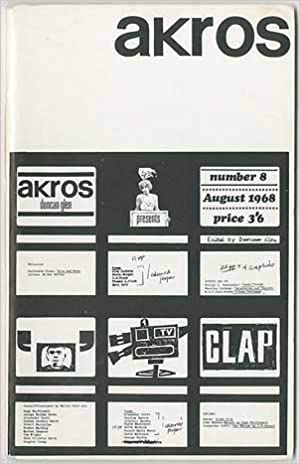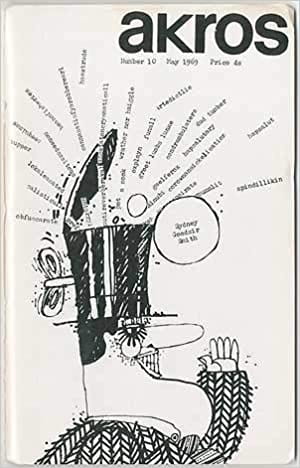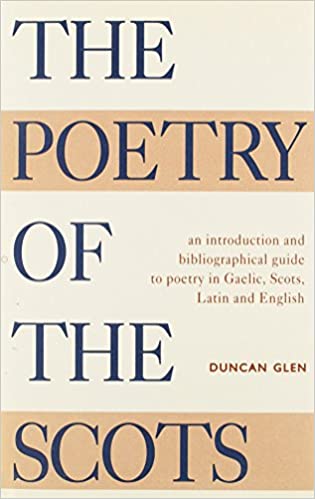Richie McCaffery introduces a key editor and poetry magazine of the 1960s-80s.
The magazine and imprint Akros began in late 1965, when the first issue, a small yellow journal, emerged from Bishopbriggs. (Its maker, Duncan Glen, soon left for more congenial work in Preston.) From its inception, Glen as editor, typesetter and designer knew exactly what he wanted his distinctive creation to be. These early issues were hand-stitched by Glen’s wife Margaret at the kitchen table, as were the limited-edition pamphlets Akros also issued, bringing forgotten poems by Hugh MacDiarmid to a new audience. As Akros gained momentum over the years, the visual appeal and ambition of the journal noticeably increased. It’s worth noting that Glen eventually became a professor in Visual Communication at Nottingham Trent University and was an authority on type-setting, fonts and print design. These skills are evident in back issues of Akros with striking covers and sometimes polychromatic pages made up from different coloured sheets of paper (and Glen occasionally used different materials like sugar paper which add something to the haptic experience of reading a magazine).
The contents of Akros issue 1 show an emphasis on Scottish writers, though not exclusively so. There is work from the old guard – Hugh MacDiarmid, Norman MacCaig and Robert Garioch – as well as up-and-coming Alan Bold, Rory Watson and James Rankin. This was going to be a magazine where writers young and old were welcome. Akros was open to submissions, not a clique, but certainly heavily male-centric. But Glen was not always so: see his continued support of Tessa Ransford, Margaret Gillies Brown or publishing Cheryl Fullon’s first pamphlet.
The first Akros editorial strikes a similar querulous note as Edwin Morgan in his well-known essay ‘The Beatnik in the Kailyard’ (1962, in New Saltire 3), lamenting the lack of support for grass-roots Scottish writers and poets in their own country. In Glen’s words:
Of course the stock answer to suggestions for publishing Scottish poetry is that it does not sell, but it is strange that while the American and English houses that publish Hugh MacDiarmid, Norman MacCaig, Iain Crichton Smith, W S Graham, Tom Scott, etc, etc. remain healthy the Scottish houses are falling, one by one, to English and American take-over bids.
We’ve heard this fighting rhetoric before, from dozens of flash-in-the-pan little magazines, but what makes Akros remarkable is its longevity. It ran for 51 issues, from 1965 to 1983 and managed to publish myriad poets and writers, often long before they’d made a name for themselves. Surprisingly, some of the younger writers he championed felt an oedipal animus towards the older Glen, as if they had outgrown him and his worth, or Glen had somehow become marginalised and irrelevant. Tom Hubbard recalls: ‘a former protégé told him: “I shall always be grateful to you for printing my early poems but we have to crush you”’.
After winding up Akros in 1984, Glen went on to publish another literary journal, Zed2O from 1991 until 2008, the year of his death. The new title carried on very much like Akros though not quite as impactful and aesthetically not as recognisably sui generis. One of the reasons for the relatively long life of Akros is that, although Glen moved to Preston, he remained devoted to the cause of Scottish writing in all its forms and struck upon the idea of ‘themed’ issues. This strategy has clearly had an influence on successive Scottish magazines, such as Joy Hendry’s Chapman and Gerry Cambridge’s The Dark Horse (1995-present), which is also immaculately designed. I don’t possess a complete run of Akros but from the copies I have, there are special issues dedicated to long poems, Edwin Muir, Sydney Goodsir Smith, MacDiarmid, MacCaig, American Poetry, Gaelic Poetry and, perhaps most desirable of all Glen’s issues, the March 1972 ‘Visual Issue’, focussing on Concrete Poetry and featuring Ian Hamilton Finlay, John Furnival, Edwin Morgan and Herbert Spencer. It’s this eclecticism that helped keep Akros vital and exciting.
We need to remember that Glen’s position as an editor of a poetry journal, a largely Scottish poetry journal, was an inherently embattled one. He is to be praised for his restraint in many debates and allowing the work of others speak for itself, as in the ‘Visual Issue’. However, Glen does sometimes get carried away into garrulity and polemics. For instance, an excerpt from the editorial to issue 3 (April 1967):
We are also pressured into the social use of “proper” language and thus we have the attempted linguistic castration of the vast majority of the Scottish people as they are forced (by communal, social authoritarianism) towards abandoning their virile, natural-to-them Scots and towards attempting proper “received” English.
This drags on for ten pages, and the fiery hectoring tone is straight out of a MacDiarmid essay from the 1920s or 1930s, though this is in 1977 and Glen is most likely preaching to the converted. Glen’s editorials are often entertaining and informative but as the 1970s wore on, he felt that his own writing was being eclipsed. He increasingly gave space in Akros to his own poetry and (laudatory) criticism of it. Like the ‘aggressively minor’ poet and bookman John Gawsworth, his main genius was as an editor, talent-spotter (‘animateur’ in Tom Hubbard’s lexicon), advocate and publisher of the overlooked. Into the 1970s and 1980s, Glen continued to publish and promote his own work and even published a somewhat boastful autobiography, The Autobiography of a Poet (Ramsay Head Press, 1986). Even his friend Alan Bold titled his withering review of the book ‘A Surfeit of Self-Satisfaction’.
Glen’s major achievement will always be Akros. It is without doubt one of the major Scottish magazines of its time, and really gained momentum in the 1970s. Glen’s winning formula was to opt for special issues and themes, promoting young but promising writers but also putting equal value on a culture of criticism. Even a quick glance at the reviews section of the magazine is not for the faint-hearted – this is not the sort of tepid, anodyne criticism we’re used to today, but rigorous and at times scathing peer feedback. Here, for instance, is Tom Scott on the Scottish poetry scene of the early 1970s:
[…] Let us turn instead to what we have. Well, we have talent: it’s not the lack of talent that’s wrong with the present scene, but some ghastly spiritual malaise; lack of enterprise, daring, passion, the ardour of youth’s mad assault on the absolute, the aspiring eye and vigilant heart of the poetic pioneers who face the vast forests of the inarticulate not with scalpels and penknives but with two-headed axes, two-man saws, climbing-irons and bulldozers. Instead of lumberjacks we have sparetime wood-carvers, knick-knackers, hobbyists, Sunday-afternoon pastimers, the foreign-office-by-day-holy-office-by-nighters, the craze-starters, fashion-mongers, would-be gauleiters, doodlers, the poetastinacademics, the wide boys, the Establishment bum-suckers, and all the rest of them. (Akros 16 / April 1971, p. 52)
His work on the reappraisal of MacDiarmid is naturally one of the lodestars of Akros but as much as Glen had one foot in the past, and was reverential about his elders, his work significantly contributed to the efflorescence of print and literary culture in Scotland in the 1970s and 1980s.
In a 2006 interview with Walter Perrie and John Herdman (both writers published early on by Akros), Glen expressed frustration that academics and careerists overshadow the tradition of criticism and publishing in Scotland by acting as arbiters of taste and gatekeepers. For Glen, editorial opinions are important and need to be more inclusive and idealist, rather than following brute market trends of what sells and what doesn’t. His triumph as an editor was to put aside his own ideology – that of Scottish nationalism – and publish writers, such as Alan Jackson, who had opposing views to his own. There is an all-embracing magnanimity to Glen’s role as an editor at Akros and this deserves to be mentioned more often and remembered. He also deserves praise as one of the most active champions of MacDiarmid’s work when it was in the doldrums; the 1960s saw a new flourishing of interest in his poetry, a much-needed rediscovery and recalibration. To finish, I’ll quote Glen quoting in turn the Irish poet John Hewitt: ‘if you cannot get a civilisation which is rooted in the local and in the parochial, you don’t have a civilisation’. With Akros Glen added hugely to Scottish culture.
Richie McCaffery is a poet and critic from Northumberland, who completed a PhD on Scottish poetry of World War Two at the University of Glasgow in 2016. He is the editor of Sydney Goodsir Smith, Poet: Essays on His Life and Work (Brill, 2020).







